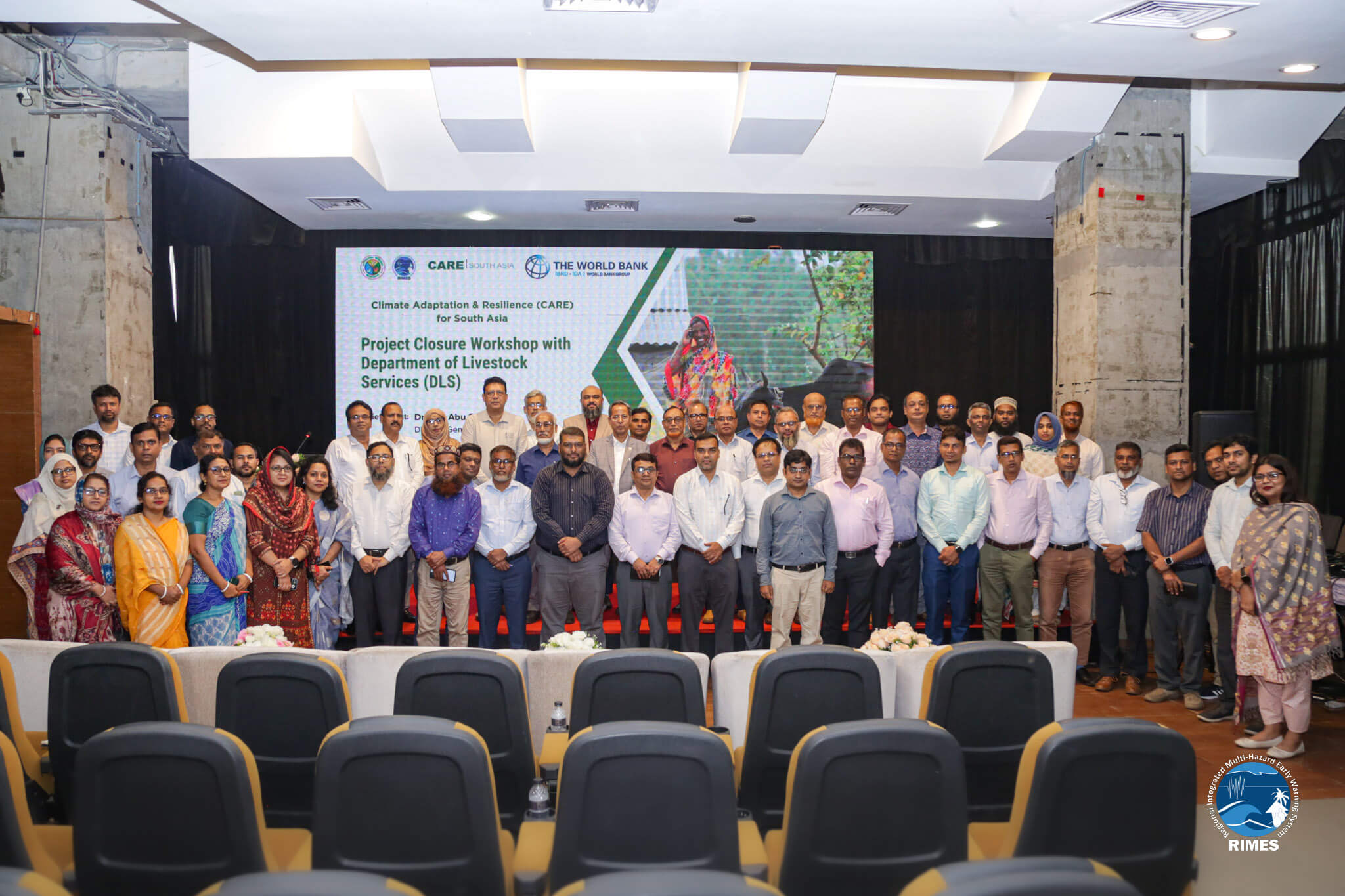Bangladesh Reflects on Achievements of National Livestock Advisory System at Project Closure Workshop

DHAKA, BANGLADESH – July 27, 2025 – RIMES in Bangladesh, in collaboration with the Department of Livestock Services (DLS), organized the project closure workshop to reflect on the advancements of the National Livestock Advisory System (NLAS) and its sustainability.
As the World Bank-supported Climate Adaptation and Resilience (CARE) for South Asia Project approaches its conclusion in 2025, the workshop served as a pivotal platform to share achievements, lessons learned, and chart pathways for the sustainability and institutional ownership of NLAS.
Raihanul Haque Khan, RIMES Country Program Lead, remarked that while it was a project closure workshop, the work on climate resilience and decision-making was "at the peak and still ongoing" through continued collaboration. He emphasized the critical need to extend this system to the farmer-level, citing feedback from Solaiman in Keraniganj, where early warning information had already provided tangible benefits. Mr. Khan also gave suggestions on how the system could be further tailored for farmer needs.
Meanwhile, DLS Upazila Livestock Officer, Dr. Mohammad Shahadat Hossain, expressed gratitude for RIMES' technical support and the World Bank's financial backing in his welcome remarks. Dr. Hossain highlighted how data from the Bangladesh Meteorological Department (BMD) automatically integrates into NLAS, enabling alerts for various hazards, climate advisories, and features like an artificial intelligence chatbox within the NLAS app. He urged attendees to disseminate knowledge of NLAS to the field, affirming DLS's commitment to the livestock sector's future and ensuring the program's efforts persist.
A live demonstration was facilitated by Sajib Hasan, RIMES IT Expert. He explained that while the NLAS website caters to national and commercial farmers, the mobile app is crucial for marginal farmers, providing location-specific early warning information. He showcased the Temperature Humidity Index (THI) for assessing heat stress in livestock, particularly during warm periods (June-August), aiding critical decision-making. Mr. Hasan stated that the ultimate goal is to provide increasingly precise and location-specific advisories. He detailed portal features such as Strategic Vaccination Planning, understanding future climate risk, regional livestock management via climatology access, and location-specific adaptation plans. The demonstration also illustrated the portal's versatility in responding to flood events with key action points, empowering users to make informed decisions.
Following this technical demonstration, Dr. Hossain presented reflections from divisional workshops, training sessions, and stakeholder consultations, outlining lessons learned and the way forward. He highlighted the project's exit strategy, covering infrastructure hosting, troubleshooting, and pipeline initiatives, and discussed NLAS's future scope.
The Chief Guest, Dr. Md. Abu Sufiun, Director General, DLS, highlighted the crucial role of data in project success for the future of livestock, suggesting that vital issues like Lumpy Skin Disease (LSD) could be included in future app updates. He emphasized that communication, spread through advisories, is a powerful tool to assist those in the field.
Feedback from the open discussion included suggestions for integrating private entrepreneurs into the database, incorporating user guides and videos (from BRAC's climate change program), and involving the private sector. Bangladesh Livestock Research Institute (BLRI) stressed the effectiveness of farmer advisories, advocating for robust research-extension links, integration with the Bangladesh Animal Health Intelligence System (BAHIS) database for comprehensive disease inclusion, and leveraging indigenous knowledge to enrich advisories. Furthermore, the Department of Fisheries proposed adding voice messages to the app. A meteorologist from BMD, recommended highlighting NLAS on the DLS website to expand its reach and emphasized ongoing updates and refresher trainings for officers to maintain relevance.
Inspiring speeches, reflection, and messages of support were received from various stakeholders. Dr. A. K. M. Humayun Kober, BCS Livestock Academics, Savar, highlighted NLAS's primary utility for Upazila Livestock Officers within a multi-stakeholder context. He stressed identifying hazards, planning rehabilitation, and incorporating NLAS into academic curricula. He emphasized the need to live with climate change, building resilience to reduce damage. Afterwards, a speech was given by Dr. Ali Akbar, former Vice-Chancellor of Bangladesh Agricultural University (BAU) and Consultant at RIMES. He expressed pride in the 5-year project's accomplishments, underscoring the continuous integration of feedback and ongoing work. He advocated for integrating the five remaining divisions, affirming that sustainability hinges on collaboration and technical assistance. Moving forward, Muhammad Shahzaman Khan, Director, Artificial Insemination, delivered an inspiring message, envisioning a green Bangladesh and a thriving livestock sector as this vital journey progresses. Lastly, Dr. Md. Shahinur Alam, Director, Livestock Medicine Store, officially closed the program, thanking all attendees. He praised the application and emphasized that efficient farmer outreach is achievable through continued collaboration, noting that the essential improvements to the system would be ongoing.
NLAS, a Decision Support System (DSS) developed by RIMES for Bangladesh's livestock sector, enables semi-automated advisory generation based on weather forecasts, climate projections, and established analytics, incorporating livestock risk parameters like health, growth, production, diseases, fodder, and shelter. It is designed to empower government officials, as institutional users, to effectively utilize the system and services. DLS, in collaboration with RIMES, conducted extensive training and workshops, including three divisional sessions, to build the capacity of relevant government officials.
This broader initiative operates under the umbrella of the World Bank-supported Climate Adaptation and Resilience (CARE) for South Asia Project (2020-2025), a 5-year endeavor dedicated to fostering climate-resilient policies and investments across the region. Component 1 of the CARE Project, implemented by RIMES, specifically focused on promoting evidence-based climate-smart policies and investments, and significantly enhanced user capacity and product development. This collaborative effort between DLS and RIMES, underpinned by the World Bank's crucial support, powerfully reaffirmed a shared commitment: to transcend the project's lifecycle and forge a more climate-resilient future for Bangladesh's indispensable livestock sector. The workshop's review of progress and assessment of capacity-building impact truly signified a pivotal leap towards this resilient future. (30)